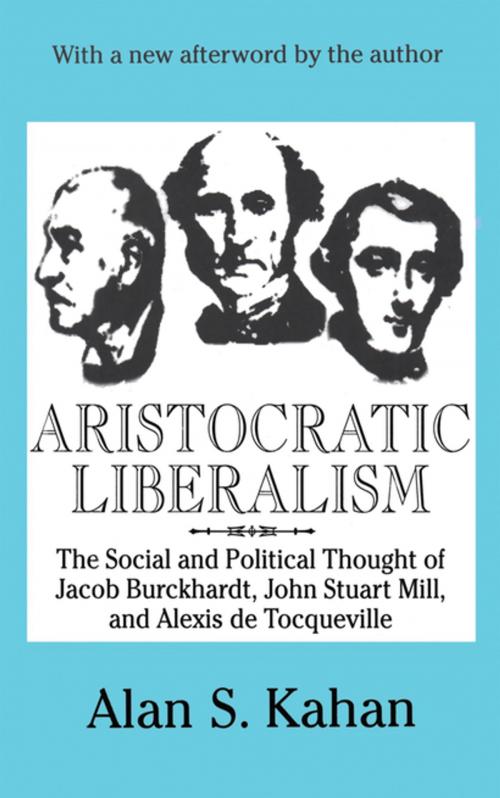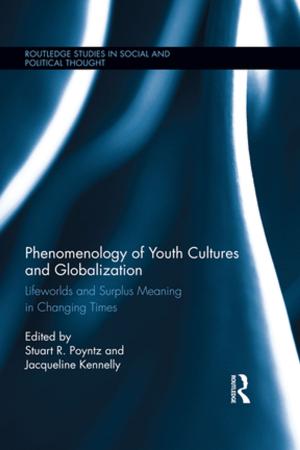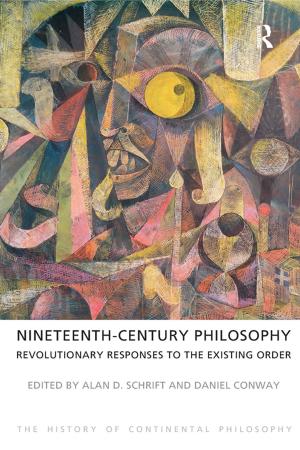Aristocratic Liberalism
The Social and Political Thought of Jacob Burckhardt, John Stuart Mill, and Alexis De Tocqueville
Nonfiction, Religion & Spirituality, Philosophy, History, Criticism, & Surveys, Social & Cultural Studies, Political Science| Author: | Alan Kahan | ISBN: | 9781351315548 |
| Publisher: | Taylor and Francis | Publication: | November 30, 2017 |
| Imprint: | Routledge | Language: | English |
| Author: | Alan Kahan |
| ISBN: | 9781351315548 |
| Publisher: | Taylor and Francis |
| Publication: | November 30, 2017 |
| Imprint: | Routledge |
| Language: | English |
"Liberalism" is widely used to describe a variety of social and political ideas, but has been an especially difficult concept for historians and political scientists to define. Burckhardt, Mill, and Tocqueville define one type of liberal thought. They share an aristocratic liberalism marked by distaste for the masses and the middle class, opposition to the commercial spirit, fear and contempt of mediocrity, and suspicion of the centralized state. Their fears are combined with an elevated ideal of human personality, an ideal which affirms modernity. All see their ideals threatened in the immediate future, and all hope to save European civilization from barbarism and militarism through some form of education, although all grow more pessimistic towards the end of their lives.
Aristocratic Liberalism ignores the national boundaries that so often confine the history of political thought, and uses the perspective thus gained to establish a pan-European type of political thought. Going beyond Burckhardt, Mill, and Tocqueville, Aristocratic Liberalism argues for new ways of looking at nineteenth-century liberalism. It corrects many prevalent misconceptions about liberalism, and suggests new paths for arriving at a better understanding of the leading form of nineteenth-century political thought. The new Afterword by the author presents a novel description of liberal political language as the "discourse of capacity," and suggests that this kind of language is the common denominator of all forms of European liberalism in the nineteenth century. Aristocratic Liberalism will be valuable to students of history, political science, sociology, and political philosophy.
"Liberalism" is widely used to describe a variety of social and political ideas, but has been an especially difficult concept for historians and political scientists to define. Burckhardt, Mill, and Tocqueville define one type of liberal thought. They share an aristocratic liberalism marked by distaste for the masses and the middle class, opposition to the commercial spirit, fear and contempt of mediocrity, and suspicion of the centralized state. Their fears are combined with an elevated ideal of human personality, an ideal which affirms modernity. All see their ideals threatened in the immediate future, and all hope to save European civilization from barbarism and militarism through some form of education, although all grow more pessimistic towards the end of their lives.
Aristocratic Liberalism ignores the national boundaries that so often confine the history of political thought, and uses the perspective thus gained to establish a pan-European type of political thought. Going beyond Burckhardt, Mill, and Tocqueville, Aristocratic Liberalism argues for new ways of looking at nineteenth-century liberalism. It corrects many prevalent misconceptions about liberalism, and suggests new paths for arriving at a better understanding of the leading form of nineteenth-century political thought. The new Afterword by the author presents a novel description of liberal political language as the "discourse of capacity," and suggests that this kind of language is the common denominator of all forms of European liberalism in the nineteenth century. Aristocratic Liberalism will be valuable to students of history, political science, sociology, and political philosophy.















